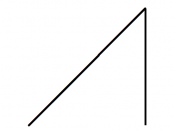Initiator power, the degree of force exerted by an initiator in driving air against resistance, is the mechanical equivalent of what is called stress in phonetics. The term 'stress', however, is most commonly applied only to variations in pulmonic pressure initiation--although, as we have seen, exactly the same type of power-variation can occur with the other initiation types. A strongly stressed syllable (or, simply, a 'stressed syllable') is one produced with high pulmonic pressure initiator power. A weakly stressed syllable (or, simply, an 'unstressed syllable') is one produced with low pulmonic pressure initiator power. Stress is one of the so-called prosodic features of speech.
Up to now we have been looking at speech-sounds as isolated phenomena. In reality, of course, spoken sounds occur strung together, one after the other. More precisely, speech is a continuum; a continuous flux of initiatory, phonatory, and articulatory states and movements, constantly changing, often overlapping and interpenetrating and influencing each other.
When we look at isolated sounds we are artificially cutting up that flowing chain of events into a series of segments or segmental sounds, as we sometimes call the speech-sounds that we isolate out of the continuum.
Although the segmentation of speech is an artificial procedure, we are obliged to do it--to arrest the flow, as it were--in order to pin down individual sounds for detailed study. We must, however, also give attention to those phonetic phenomena that are characteristic not so much of the individual segments as of their relations to each other, or of stretches of the speech-continuum that are greater than one segment in length. Because such phenomena take account of more than just segments they are sometimes called suprasegmental features. Another name for them is prosodic features, or prosodies, and these are the terms we shall use.
The prosodic...


